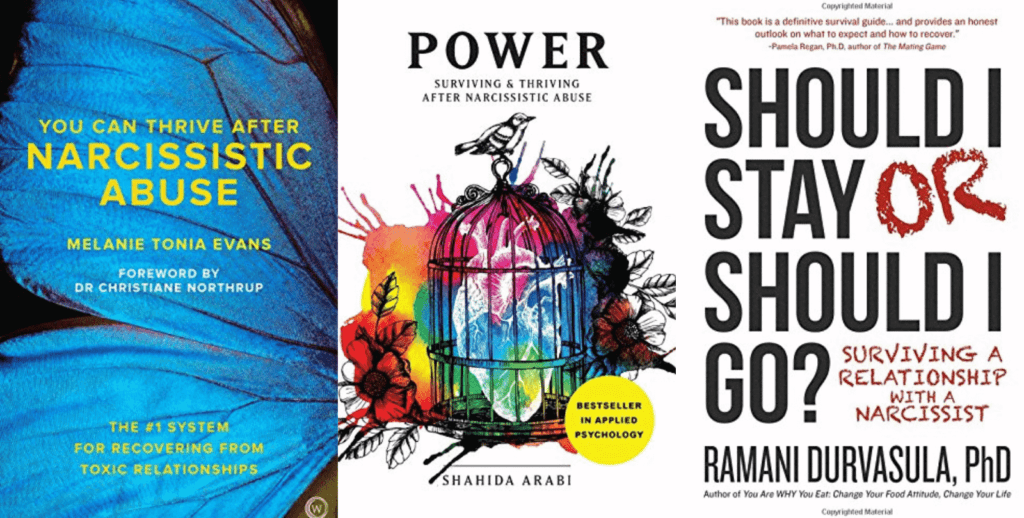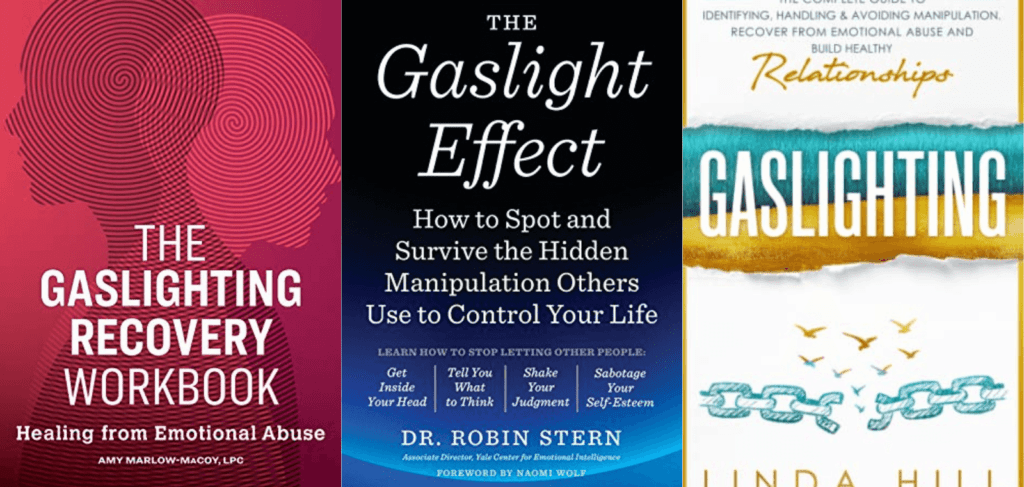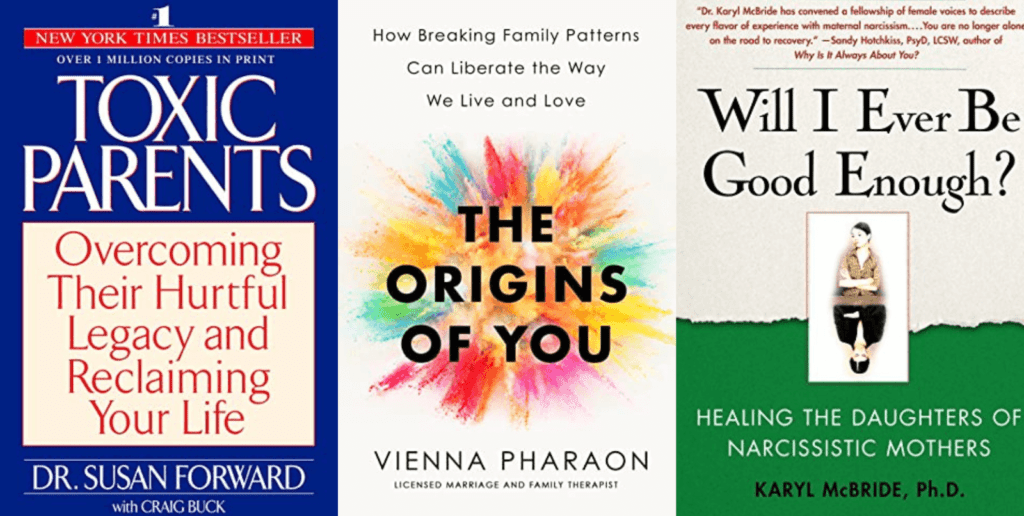The following are some of the best books on narcissistic abuse to help you embark on your recovery journey.
Disclosure: Some of the links below are affiliate links. This means that, at zero cost to you, I will earn an affiliate commission if you click through the link and finalize a purchase.
Books On Narcissistic Abuse
1. Disarming the Narcissist
By Wendy T. Behary LCSW
Now a self-help classic, Disarming the Narcissist is a practical, step-by-step communication guide to help you cope with and confront the narcissist in your life. Based on reader feedback, this fully revised and updated third edition features new information on shame, hypersexuality, and infidelity in narcissism; legal information to help you if you are divorcing a narcissist; and the impact of narcissism on children.
Related: Narcissistic Relationship Pattern (+ 14 Tips On How To Deal With Narcissistic Relationship Patterns)
2. Should I Stay or Should I Go?
By Ramani Durvasula PhD
Should I Stay or Should I Go? is a survival manual, a guidebook, and a shot of reality. Some people will never change, and kissing frogs is the stuff of fairy tales, not real life. The Beast never turns out to be a nice guy (or gal). This is a book that breaks down what mean people do to us, how they do it, and what we can do to survive.
Related: Am I Being Gaslighted Quiz (& How To Recover From Gaslighting In 10 Steps)
3. The Covert Passive-Aggressive Narcissist
By Debbie Mirza
This book delivers:
- A list of traits of the covert narcissist and how they look like in daily life
- The differences between an overt and a covert narcissist
- A checklist to see if you are with a covert narcissist
- Real-life stories to illustrate what these traits look like
- Explanations of different covert techniques narcissists use to control and manipulate
- A chapter dedicated to what sex looks like with a covert narcissist
- Descriptions of covertly narcissistic parents Information on what it looks like to have a covertly narcissistic boss or co-worker
- A chapter on healing to help give you tools and hope for a beautiful future, free of toxic relationships.
Related: 21 Stages of a Narcissist Relationship (+FREE Breakup Recovery Worksheets)
4. Out of the Fog
By Dana Morningstar
The FOG is an acronym that stands for “Fear, Obligation, and Guilt.” These three emotions are often at the core of manipulation and are often how narcissists, sociopaths, and other types of emotional manipulators go about controlling their targets.
The author makes simple distinctions between what is healthy and unhealthy.
Related: 8 Stages Of Healing After Narcissistic Abuse (+FREE Breakup Recovery Worksheets)
5. POWER
By Shahida Arabi
Shahida Arabi’s articles on narcissistic abuse have gained renown as some of the most accurate and in-depth depictions of this terrifying trauma, resonating with millions of survivors all over the world and receiving endorsements from numerous mental health professionals. In this essay compilation, readers can enjoy some of her most popular articles as well as new thought pieces on narcissistic abuse: what therapists have to say about malignant narcissists and how children of narcissistic parents can become trapped in the trauma repetition cycle.
Related: Healing From A Narcissistic Abuse By A Parent – 7 Practical Strategies
6. Gaslighting & Narcissistic Abuse Recovery
By Don Barlow
In Gaslighting & Narcissistic Abuse Recovery, you will discover:
- The sneaky tactics gaslighters employ that catch you off-guard and make you more vulnerable to their exploitation
- How to hold on to your grip on reality, despite the gaslighter’s efforts to undermine it
- Powerful ways to respond to gaslighters, block their attacks, and take back control of the conversation
- Why self-care is a critical component in coping with abuse, especially if you need to regularly interact with a gaslighter
- The shift in mindset to help you finally gain the courage to escape an abusive relationship
- What you need to do after leaving a gaslighting relationship to make sure you don’t fall into the same cycle again
- Why you shouldn’t expect any closure from your abuser, and why you can still move on without it
- How to rebuild your sense of self after years of being torn down by othersAnd much more.
Related: Top 10 Tips For Setting Boundaries With Narcissistic Parents
7. The Highly Sensitive Person’s Guide to Dealing with Toxic People
By Shahida Arabi MA
In The Highly Sensitive Person’s Survival Guide to Dealing with Toxic People, you’ll learn evidence-based skills grounded in cognitive-behavioral therapy (CBT) and dialectical behavior therapy (DBT) to help you recognize and shut down the common manipulation tactics used by toxic people, such as gaslighting, stonewalling, projection, covert put-downs, and love bombing. You’ll also discover targeted tips to protect yourself from the five main types of toxic people:
- Garden-variety boundary-steppers
- Crazymakers and attention-seekers
- Emotional vampires
- Narcissists
- Sociopaths and psychopaths
Related: Top 5 Reasons Why Narcissists Target Empaths – & How to Starve The Narcissist of Supply
8. You Can Thrive After Narcissistic Abuse
By Melanie Tonia Evans
In this book, you will learn how to:
• recognize if you are in an abusive relationship
• detach or remove yourself from the narcissist’s ability to affect or abuse you
• identify your subconscious programming, release it, and replace it
• focus on healing yourself to become empowered to thrive and not just survive
With thousands of patients successfully treated worldwide, this revolutionary program is designed to heal you from the inside out.
Related: Resources For Narcissistic Abuse (Support Groups, Podcasts, TED Talks, Books)
9. Children of the Self-Absorbed
By Nina W Brown EdD LPC
Children of the Self-Absorbed offers clear definitions of narcissism and narcissistic personality disorder to help you identify the extent of your parent’s problem. You’ll learn the different types of destructive narcissism and how to recognize their effects on your relationships. Packed with proven techniques, you’ll realize that you’re not helpless against your parent’s behavior, and that you don’t have to give up on the relationship. Instead, you’ll find realistic strategies and steps for setting up mutually agreed upon behaviors, so you can fulfill your own emotional needs.
In this new edition, you’ll discover:
- Skills for managing intense emotions
- Tools for building character, self-esteem, and self-acceptance
- How kindness and gratitude can promote self-healing
- How to build trust and empathy with others
Related: How Narcissists Treat Their Exes (+FREE Worksheets PDF)
Workbooks On Narcissistic Abuse
10. The Narcissism Recovery Workbook
By Brenda Stephens MS LPCC
This narcissistic abuse recovery workbook can be used on its own or alongside The Narcissism Recovery Journal to further reflect on and grow from your experiences.
- Healing practices—Start your recovery with guided exercises that will help you reclaim your identity and set healthy boundaries.
- Tried-and-true methods—Exercises rooted in positive psychology, CBT, meditation, and other proven therapeutic approaches empower you to make lasting changes.
- Real-life experiences—Find strength from the knowledge that you aren’t alone thanks to stories of others who overcame narcissistic abuse.

How Books On Narcissistic Abuse Can Help
Here’s how these books can assist:
1. Understanding Narcissistic Abuse: These books often provide a comprehensive understanding of narcissistic abuse, including patterns, dynamics, and characteristics of narcissistic individuals. They can help individuals make sense of their experiences and realize that they are not alone.
2. Validation and Support: Books on narcissistic abuse can validate individuals’ feelings and experiences. They often include real-life stories and testimonials that offer support and reassurance, helping individuals recognize that what they went through was not their fault.
3. Identifying Manipulative Tactics: Narcissistic abusers often employ various manipulative tactics to gain control over their victims. Books can educate individuals about these tactics, such as gaslighting, love bombing, triangulation, and emotional blackmail. Recognizing these behaviors can empower individuals to break free from the cycle of abuse.
4. Healing and Recovery: Many books provide guidance on healing and recovering from narcissistic abuse. They offer practical strategies, techniques, and exercises to rebuild self-esteem, establish healthy boundaries, and develop self-care habits. They also emphasize the importance of seeking professional help if necessary.
5. Empowerment and Moving Forward: Books on narcissistic abuse often focus on empowering individuals to regain control over their lives. They emphasize the significance of self-love, self-compassion, and personal growth. These books can inspire individuals to let go of the past and create a fulfilling future free from abuse.
Conclusion
Books on narcissistic abuse can be incredibly helpful for individuals who have experienced or are currently experiencing narcissistic abuse.
It’s important to approach these books with an open mind and seek professional support if needed.
Each individual’s experience is unique, and the healing process may take time.













